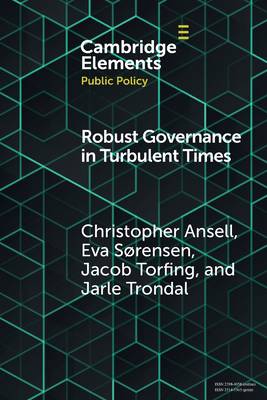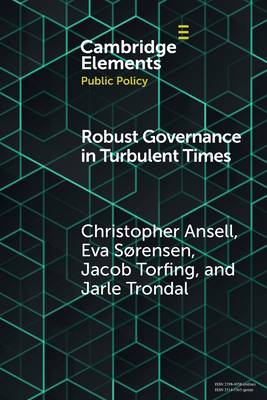
Bedankt voor het vertrouwen het afgelopen jaar! Om jou te bedanken bieden we GRATIS verzending (in België) aan op alles gedurende de hele maand januari.
- Afhalen na 1 uur in een winkel met voorraad
- In januari gratis thuislevering in België
- Ruim aanbod met 7 miljoen producten
Bedankt voor het vertrouwen het afgelopen jaar! Om jou te bedanken bieden we GRATIS verzending (in België) aan op alles gedurende de hele maand januari.
- Afhalen na 1 uur in een winkel met voorraad
- In januari gratis thuislevering in België
- Ruim aanbod met 7 miljoen producten
Zoeken
€ 33,45
+ 66 punten
Omschrijving
This Element aims to build, promote, and consolidate a new social science research agenda by defining and exploring the concepts of turbulence and robustness, and subsequently demonstrating the need for robust governance in turbulent times. Turbulence refers to the unpredictable dynamics that public governance is currently facing in the wake of the financial crisis, the refugee crisis, the COVID-19 pandemic, the inflation crisis etc. The heightened societal turbulence calls for robust governance aiming to maintain core functions, goals and values by means of flexibly adapting and proactively innovating the modus operandi of the public sector. This Element identifies a broad repertoire of robustness strategies that public governors may use and combine to respond robustly to turbulence. This title is also available as Open Access on Cambridge Core.
Specificaties
Betrokkenen
- Auteur(s):
- Uitgeverij:
Inhoud
- Aantal bladzijden:
- 108
- Taal:
- Engels
- Reeks:
Eigenschappen
- Productcode (EAN):
- 9781009433020
- Verschijningsdatum:
- 16/05/2024
- Uitvoering:
- Paperback
- Formaat:
- Trade paperback (VS)
- Afmetingen:
- 152 mm x 229 mm
- Gewicht:
- 154 g

Alleen bij Standaard Boekhandel
+ 66 punten op je klantenkaart van Standaard Boekhandel
Beoordelingen
We publiceren alleen reviews die voldoen aan de voorwaarden voor reviews. Bekijk onze voorwaarden voor reviews.









